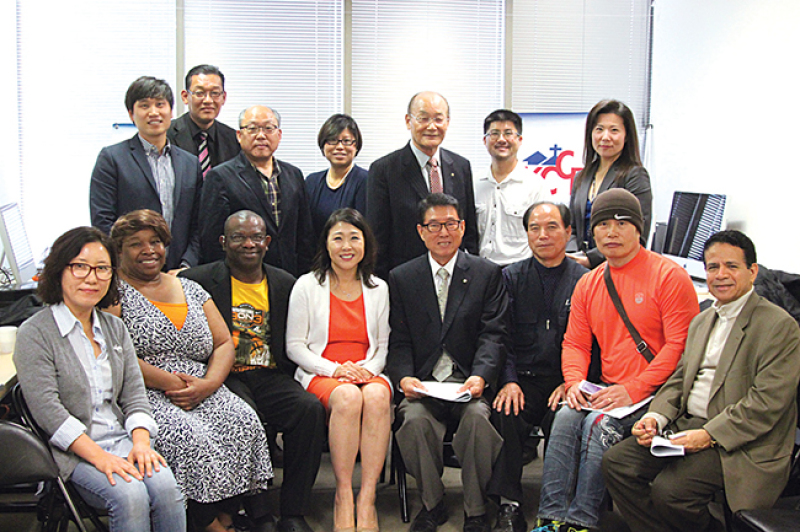
About 20 leaders of the community and homeless ministries gathered in Los Angeles on Tuesday morning to share and discuss what they have been doing thus far in terms of reaching out to the homeless, what resources they need and may be able to receive from the government, and ways they can partner with the government to be more effective in their outreach.
The session, which was hosted by Korean Churches for Community Development (KCCD), was attended by representatives of about a dozen organizations, including Grace Community Services (a ministry part of Grace Ministries International), CCCLA, World Martial Arts Mission, and New World Mission.
Ben Pak from the office of Senator Kevin de Leon, and Ashlee Oh, a consultant for the homeless initiative of Los Angeles County, were also present at the gathering.
Hyepin Im, the CEO and president of KCCD, said that the gathering came about because she noticed that many organizations and ministries have been doing much to reach out to and help the homeless but have not been receiving attention or recognition from the government, potentially causing them to miss out on resources they may be qualified for.
"But even if none of you are able to receive any funding or resources as a result of this meeting, at the very least, my hope is that you would get to know each other and encourage one another," Im said to start the meeting.
Previous to the meeting, KCCD had conducted an informal survey with about 30 churches, organizations, and individuals who have been involved with homeless outreach work. Of those who participated in the survey, 29 said they provide food, 28 said they provide clothing, 23 said they provide worship and spiritual support, and 12 said that they provide some sort of housing or connect individuals to housing opportunities.
More than half said they need some type of money, financial support, grant, funding, or donation in response to the question, "What support do you need in working with the homeless?" Several said they need more volunteers, and a few said they would like networking opportunities to learn from other organizations and see how they can work together.
Pak and Oh shared some of the initiatives that the government has recently launched, both on the county and state levels, that may allow some to receive funding, and also allow these organizations to become a part of the greater process in combating homelessness.
On the state level, Pak explained the "No Place Like Home' Initiative that was announced in January this year, a multi-billion dollar initiative to prevent and address homelessness that received bipartisan support. The proposal focuses on providing housing, as state lawmakers hope to spend $2 billion to build permanent supportive housing for homeless individuals, as well as $200 million to provide supportive short-term housing and rent subsidies.
"This money will be trickling down very soon in a few years," said Pak, "and I hope the community is engaged. Individuals, ministries, or organizations should get ready to be one of the non-profit organizations eligible to receive this funding."
On the county level, Oh elaborated on 47 strategies that were just approved by the Los Angeles County Board of Supervisors in early February to tackle homelessness. Members of the community are also invited to participate in the implementation process as part of a workgroup and/or by providing feedback to policy drafts, Oh said. Strategies include increasing employment for homeless adults; providing subsidized housing and expanding general relief housing subsidies; enhancing services for transition age youth; and creating homeless prevention programs for families.
One representative from New World Mission who has been doing homeless outreach for some 20 years shared that he personally knows of a few Korean homeless individuals who simply stay at the home of people who are doing homeless outreach-related work, as well as some who consolidate resources to live four to five people to a room. Others also shared of specific people and organizations that have been providing informal housing. Would these people be qualified to receive any funding or resources, or does it have to be a formal shelter or housing building?
"Every unit counts," Oh responded, and shared that they may be able to receive funding from the county but would need to meet with them separately to hear about the circumstances.
The two-hour meeting mostly touched upon these funding and resource opportunities, and Im shared a willingness to start a loose network of those who are involved with homeless outreach to continue sharing information and resources.



















